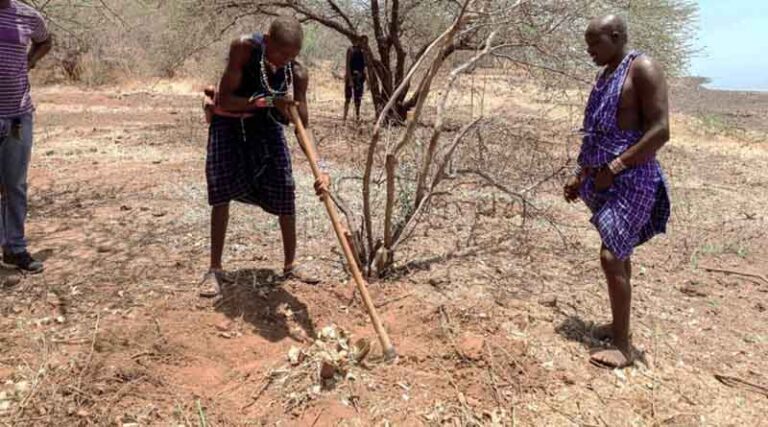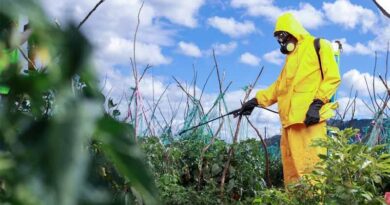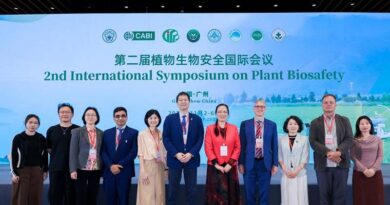
The Silent Invasion: A Community’s Fight To Reclaim Its Land From Invasive Prosopis Weed
24 October 2025, kenya: Deep in northern Tanzania, the vast plains around Lake Natron basin are home to the Maasai whose lives and livelihoods are deeply intertwined with the land.
The lake Natron basin is situated in Ngorongoro and Monduli districts within the Arusha region, in northern Tanzania contiguous with the Kenyan border.
For generations, this stunning landscape has consistently provided grazing for their livestock and an essential sanctuary for vibrant wildlife, including the majestic flamingos that flock to the lake for breeding.
Disrupting livelihoods and daily life
A silent invader has been threatening this way of life: Prosopis juliflora, a thorny, fast-growing tree. It has become a menace, aggressively taking over pastures and blocking essential paths to homesteads.
The invasion has been particularly challenging for women, who bear the primary responsibility for fetching water for their households. The blocked routes to water points force them to take longer, more arduous paths, adding a significant burden to their daily lives and increasing the risk of injury from the thorns.
Beyond this, the tree has injured livestock with its piercing thorns, causing deformities that compromise their mobility and productivity. For the communities of Pinyinyi and Wosi-Wosi, the very survival of their way of life and the fragile ecosystem was at risk.
The Maasai communities depend on seasonal grazing routes and corridors to move animals to pasture, water, and ultimately, to market. Prosopis acts as an impassable, living wall such that rangelands choked by prosopis is a rangeland whose produce cannot efficiently reach the market, creating a subtle but potent non-tariff trade barrier.
According to the sentiments of the community chairperson of Wosi-Wosi, Mr Marco Kaleku, “Here in Wosi-Wosi, where our village borders Kenya, the invasive prosopis is not just an environmental threat it is a clear trade barrier. This plant doesn’t respect our boundary lines and has blocked the traditional cattle routes, making it dangerous and expensive to move our livestock to markets, whether north into Kenya or south into Tanzania.
“Our cows have lost weight, our traders lost money, and our whole community now suffers a drop in income. It has even resulted in conflicts among the communities as we are fighting for minimal resources in terms of pasture access.”
A partnership for change
Recognizing this critical threat, CABI for the past three years through the Darwin initiative project and alongside partners from Tanzania (TAFORI, CORDS, TNRF, TAWA), has supported local communities to fight back.
The partnership began with a simple, yet powerful, method: an exchange visit to a heavily prosopis infested area in KAHE district in Moshi triggered a call to action by the communities.
This was followed by training community members on how to effectively cut and uproot or burn the trees at the stump to prevent regrowth. Communities were taught the fact that simply cutting was not effective as a management option unless this was followed by the application of a cut stump herbicide to kill the plant. However, chemicals are not easily accessible to community members.
The community’s response was nothing short of remarkable. They took full ownership of the problem, pooling their own resources to sustain the work. For example, in Wosi-Wosi, community members contributed goats’ worth over Tshs 2,800,000 (USD $1,217 equivalent) to feed the workers. This level of commitment showed that they recognized the threat as a shared problem, and they were willing to take collective action to protect their future.
The power of learning from neighbours
While community action was a crucial first step, a key lesson emerged that could change the entire approach to managing invasive species. During a recent learning exchange, the community from Pinyinyi visited a heavily infested area in neighbouring Shompole, Kenya. What they saw was a cautionary tale: a landscape almost completely choked by Prosopis. Seeing the crisis firsthand ignited a fierce determination in the Pinyinyi community.
They immediately vowed not to allow the same to happen to them. Their commitment became a powerful, proactive stance: even herders grazing their livestock must now uproot any small Prosopis plants they find, ensuring the species is controlled before it establishes itself.
This peer-to-peer learning was more motivating than any report or presentation. It was a tangible example of the cost of inaction. In contrast, the community from Wosi-Wosi, which had delayed action, now regrets not acting sooner. Their experience serve as a clear reminder that, when it comes to invasive species, a timely and decisive response is critical.
Building a sustainable future
The experiences of Pinyinyi and Wosi-Wosi, supported by CABI as part of the Darwin initiative consortium, offer a powerful roadmap for other communities facing similar challenges. They show that community ownership is the most critical ingredient for success. However, a truly sustainable long-term solution also requires an integrated approach combining different methods including the introduction of biological control agents and community sensitization.
To turn a short-term fight into a long-term victory, communities need:
Better tools: The current manual methods are slow and labour-intensive. Providing proper tools will accelerate the work and reduce the immense physical burden on community members. Some of the trees require a chain saw to bring them down as machetes are not very effective.
Ecological restoration: Clearing the trees is only half the battle. Restoring the land with native grasses and vegetation is crucial to prevent the species from reinvading. Native grasses and forbs will outcompete invasive prosopis for resources and help restore the natural biodiversity of the ecosystem. This also provides fodder for livestock, directly benefiting livelihoods.
Stronger partnerships: The fight against Prosopis is too big for one community alone. It requires collaboration between local leaders, government agencies, NGOs, researchers, and even the private sector. The tourism industry, for example, has a vested interest in a healthy ecosystem and can be a powerful partner in clearing and restoration efforts
The case of Lake Natron demonstrated that even the most daunting challenges can be overcome with a strong sense of community, a willingness to learn from others, and the right tools and partnerships. It’s a powerful reminder that with the right support, like that provided by CABI and partners of the Darwin initiative, local communities hold the key to protecting our most precious landscapes.
The commitment shown by the communities in the Lake Natron basin is commendable, but the sheer scale of the prosopis juliflora crisis demands more than just machetes and community labour. As the national forestry research body, TAFORI views this invasion as a critical threat to our national rangeland biodiversity and food security.
TAFORI Invasive Species Management Focal Person, Mr Dickson Xavery, said, “We’ve seen firsthand how prosopis, with its deep roots and aggressive seed dispersal, completely alters soil chemistry and hydrological cycles, making it almost impossible for native grasses and therefore livestock to survive,” says the.
“The future strategy must be highly integrated: we need to combine the community’s demonstrated zeal for manual removal with chemical control research, immediate ecological restoration using native species, and, crucially, the long-term strategic deployment of tested biological control agents. This is the only way to move from short-term clearance to permanent ecological victory against this persistent foe.”
📢 If You’re in Agriculture, Make Sure the Right People Hear Your Story.
From product launches to strategic announcements, Global Agriculture offers unmatched visibility across international agri-business markets. Connect with us at pr@global-agriculture.com to explore editorial and advertising opportunities that reach the right audience, worldwide.






